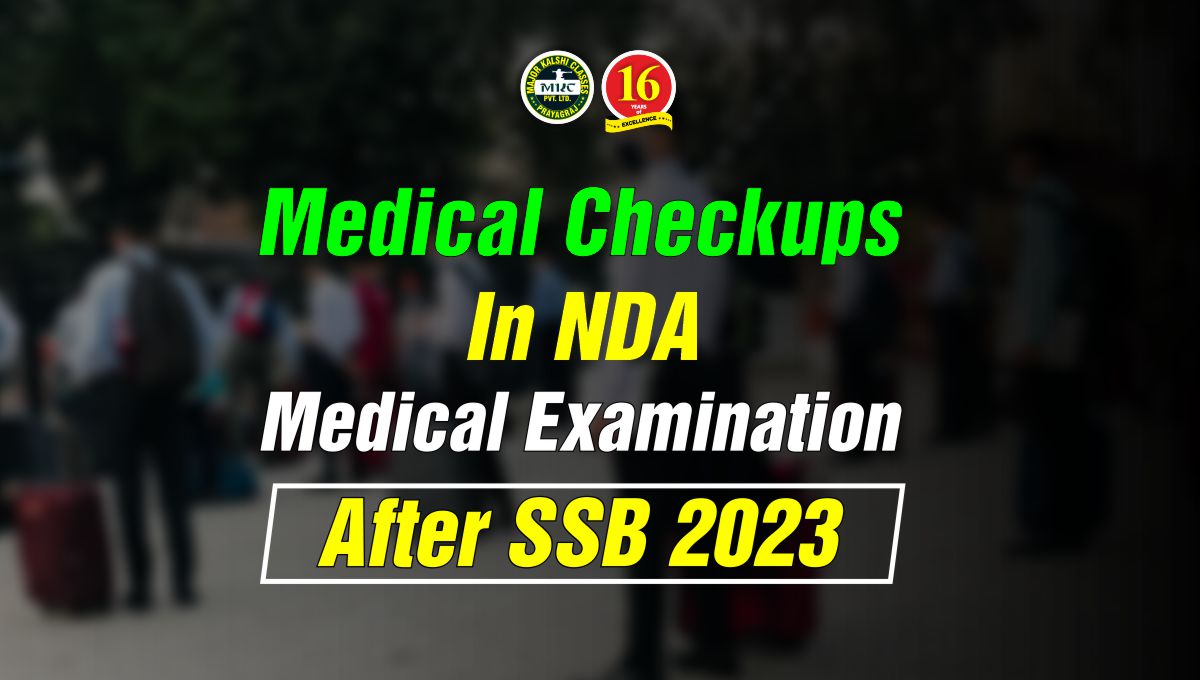Medical Checkups in NDA Medical Examination after SSB 2023
During the NDA medical examination after the SSB interview, candidates undergo a comprehensive series of medical checkups to assess their physical and mental fitness. While the exact tests may vary, here is a list of commonly conducted medical checkups:
The National Defence Academy (NDA) is one of the premier institutions in India for training young individuals to become officers in the Indian Armed Forces. The selection process for NDA involves a series of rigorous tests, one of which is the Services Selection Board (SSB) interview. After successfully clearing the SSB interview, candidates undergo medical checkups as part of the NDA medical examination.
Medical Checkups in NDA:-
- Anthropometry: Height, weight, and body mass index (BMI) measurements are taken to assess the overall physical fitness and suitability of the candidate.
- Vision Test: Candidates undergo a visual acuity test to evaluate their visual capabilities. This may include reading charts or identifying objects at varying distances.
- Audiometry Test: A hearing test is conducted to assess the candidate’s auditory acuity and ability to perceive different sound frequencies.
- Cardiovascular Examination: The cardiovascular system is evaluated through methods such as blood pressure measurement, pulse rate assessment, and listening to the heart sounds with a stethoscope.
- Respiratory Examination: The respiratory system is examined to ensure proper lung function and respiratory health. Candidates may be asked to perform breathing exercises or undergo pulmonary function tests.
- Musculoskeletal Examination: The musculoskeletal system is assessed to evaluate the candidate’s physical strength, flexibility, and overall musculoskeletal health. This may include testing joint mobility, assessing muscle strength, and evaluating posture.
- Dermatological Examination: The skin is examined for any visible abnormalities, infections, or dermatological conditions.
- Gastrointestinal Examination: The digestive system is assessed to identify any digestive disorders or gastrointestinal health issues.
- Genitourinary Examination: This examination evaluates the genitourinary system, including the reproductive organs and urinary system, to ensure normal functioning.
- Laboratory Investigations: Candidates may undergo various laboratory tests, including blood tests, urine tests, and X-rays, to assess overall health, identify potential health risks, and detect underlying medical conditions.
- Psychological Assessment: Mental health and psychological fitness are evaluated through psychological tests, interviews, and assessments to ensure candidates possess the necessary mental resilience and stability required for a career in the Armed Forces.
It is important to note that this is a general list, and the specific tests and examinations may vary based on individual circumstances, the preferences of the medical board, and the requirements of the Armed Forces. The purpose of these medical checkups is to ensure that candidates meet the necessary health standards to serve as officers in the Indian Army, Navy, or Air Force.
NDA Medical Examination after SSB 2023:-
The medical examination holds great significance as it assesses the physical and mental fitness of candidates to determine their suitability for a career in the Armed Forces. It is conducted to ensure that only the most physically and mentally robust individuals are chosen to join the NDA and later serve in the Army, Navy, or Air Force.
The NDA medical examination consists of a comprehensive series of tests, which are performed to assess various aspects of a candidate’s health. These tests include both physical examinations and laboratory investigations.
During the physical examination, candidates undergo a thorough evaluation of their overall health. This examination typically involves assessing the candidate’s height, weight, body mass index (BMI), vision, hearing, cardiovascular health, respiratory system, musculoskeletal system, and various other aspects. The purpose is to identify any existing medical conditions or physical limitations that may affect a candidate’s ability to perform the duties required of an officer in the Armed Forces.
Candidates are also required to undergo laboratory investigations such as blood tests, urine tests, and X-rays. These tests help in detecting underlying health conditions or potential risks that may not be evident during the physical examination. The results of these investigations provide valuable information about a candidate’s health and help the medical board in making informed decisions regarding their suitability for military service.








